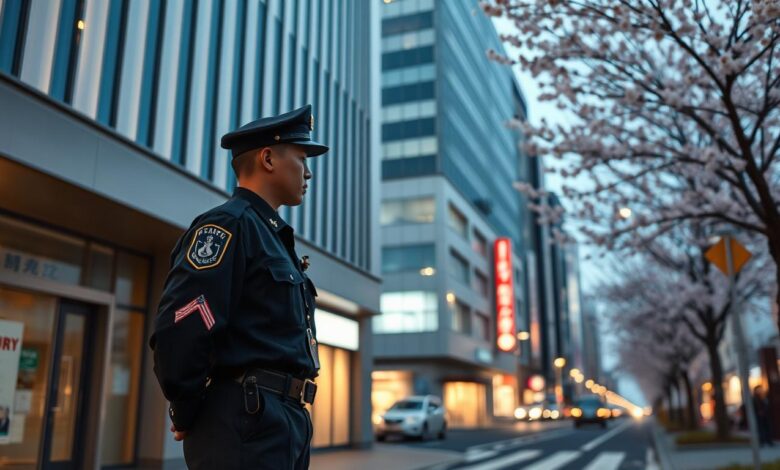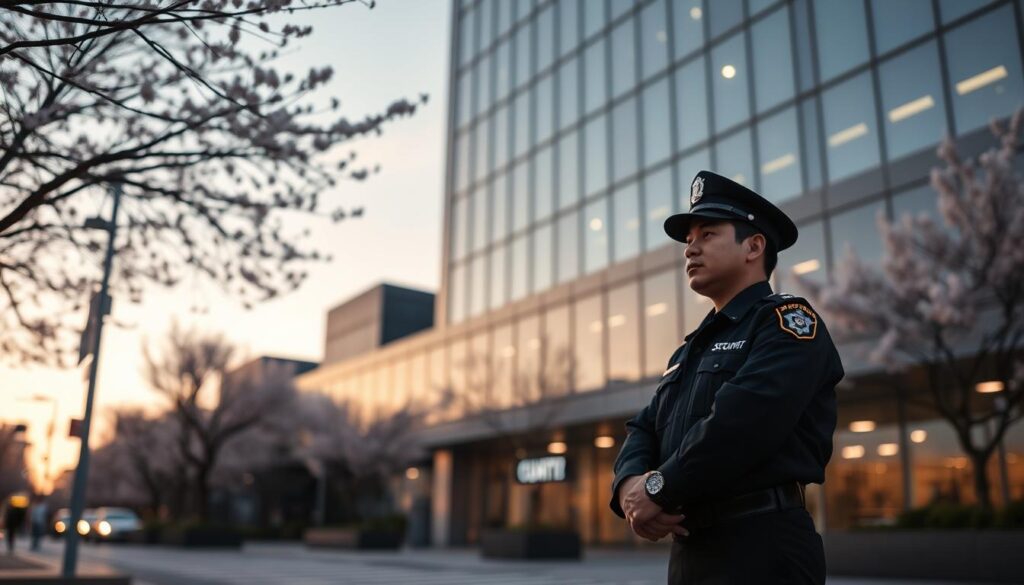Salary Insights: Security Guards in Japan

The salary of security guards in Japan is key to understanding this important job. It’s vital for those looking for work, those already employed, and employers. This article will give a detailed look at what security guards earn, including industry stats and regional pay differences.
We’ll use real data to show the average pay for security guards nationwide. We’ll also look at what affects these salaries.
Introduction to Security Guard Salaries in Japan
The security industry in Japan is growing fast. This is because more people need protection in public and private places. With more buildings and technology, there’s a bigger need for skilled security workers. This affects how much they can earn.
Overview of the Security Industry
Security guards in Japan keep many places safe. This includes offices, public areas, and event spaces. With more jobs available, their pay is going up. Employers want people with the right skills and training to protect assets and people.
Importance of Understanding Salary Insights
It’s important for new security workers to know about salaries. Knowing the average pay helps them ask for better wages. It also helps them see how their experience and location affect their earnings. This knowledge helps workers make better career choices.
Average Security Guard Salary in Japan
Understanding the average security guard pay in Japan is key to grasping the financial side of this job. Many things affect how much security guards earn in Japan. Looking at current data and salary ranges gives us a detailed view. This includes what different experience levels and education backgrounds can earn.
Current Statistics and Salary Ranges
The average yearly salary for a security guard in Japan is about 1,930,500 JPY. Salaries can range from 965,800 JPY to 2,987,000 JPY. This shows a big range in what people can earn.
Monthly, the average salary is 161,000 JPY. Most security guards make between 94,000 JPY and 131,000 JPY a month. This covers about 65% of the workforce. The lowest salary is 80,500 JPY, and the highest is 249,000 JPY.
Factors Influencing Average Salary
Many things affect how much security guards earn in Japan. Experience and education are two big ones. More experience means higher pay:
| Years of Experience | Average Monthly Salary (JPY) |
|---|---|
| 0-2 years | 96,500 |
| 2-5 years | 128,000 |
| 5-10 years | 171,000 |
| 10-15 years | 204,000 |
| 15-20 years | 220,000 |
| 20+ years | 236,000 |
The gender pay gap is also a concern. Men earn about 4% more than women. Education also matters a lot. Guards with a diploma make about 2,734,500 JPY a year. This is much more than those with just a high school diploma, who make about 1,716,600 JPY.

How Much Do Security Guards Make Japan
The pay for security guards in Japan changes a lot depending on where they work. Places like Tokyo and Yokohama usually pay more than rural areas. In Tokyo, they can make up to ¥1,930,500 a year. In less busy places, they might earn about ¥1,159,000.
Comparison of Salaries by Region
Salaries can vary a lot by region. Guards in cities like Tokyo often get paid more per hour and year. Here’s a table showing average salaries by area:
| Region | Average Annual Salary (JPY) | Average Hourly Wage (JPY) |
|---|---|---|
| Tokyo | 1,930,500 | 1,200 |
| Kanagawa | 1,750,000 | 1,100 |
| Chiba | 1,550,000 | 1,000 |
| Saitama | 1,450,000 | 950 |
| Rural Areas | 1,159,000 | 900 |
Hourly Wage for Security Guards in Japan
The hourly wage for security guards in Japan is between ¥900 and ¥1,200. This can change based on experience, location, and job type. Day shift workers usually start at ¥1,125. Night shift workers, who have tougher jobs, get about ¥12,600 per shift.
Incentives and Bonuses
Security guards also get bonuses and incentives. About 31% of them get bonuses, which can be up to 3% of their yearly salary. These extra payments help make up for lower salaries and keep workers happy.

Income of Security Guards in Japan: Roles and Responsibilities
Security guards in Japan play key roles in keeping businesses and people safe. Their jobs vary, affecting their pay. Knowing these roles helps us understand their salaries better.
Different Types of Security Positions
In Japan, security jobs fall into three main categories:
- Static Guards: They watch over specific spots, keeping them safe. They start at about 345,000 yen a month.
- Mobile Patrol Officers: These officers move around, acting as a crime deterrent. Their pay is similar to static guards, but with travel costs added.
- Security Consultants: With lots of experience, they help design security plans. They can earn over ¥10,000,000 a year.
Impact of Experience on Salary
Experience greatly affects a security guard’s salary in Japan. New guards start at less than ¥6,000,000. As they gain more experience, their pay goes up. Senior guards in finance and insurance can earn a lot more.
The table below shows how salary changes with experience:
| Experience Level | Annual Salary Range (Yen) |
|---|---|
| Entry-Level (0-2 years) | 5,000,000 – 6,000,000 |
| Mid-Level (3-5 years) | 6,000,000 – 8,000,000 |
| Senior Level (5+ years) | 8,000,000 – 10,000,000+ |
This income range helps new guards see their future earnings. It also helps them choose the right career in security. As demand grows, so do the chances for better pay and benefits. Knowing what security guards earn in Japan is key for those thinking about this career.
Conclusion
The earning potential for security guards in Japan varies based on several factors. These include the location, experience, and specific job roles. Areas with higher costs of living tend to pay more. As guards gain experience and specialize, their earnings can rise significantly.
It’s also important to keep up with the latest in the security industry. Events like the RSA Asia Pacific & Japan conference show the growing need for better security. This is due to laws like the Personal Data Protection Act (PDPA). These changes affect how much security guards can earn and what skills they need.
For those looking to join the security field, there are many resources available. Networking and educational workshops can help guide their career. The security industry in Japan is growing, making it key for individuals to understand the earning potential and adapt to changes.
FAQ
What is the average security guard salary in Japan?
How much do security guards make in metropolitan areas like Tokyo?
What is the hourly wage for security guards in Japan?
What factors influence the salary of security guards in Japan?
How does experience affect the earning potential for security guards in Japan?
Are there different types of security positions in Japan?
Why is understanding security guard salaries important for job seekers?
What other benefits or incentives are available for security guards in Japan?
Source Links
- Security Manager Salary in Japan | Salary.com – https://www.salary.com/research/jp-salary/benchmark/security-manager-salary/jp
- Average Salary in Japan 2024: In-depth Analysis – https://desktrack.timentask.com/blog/average-salary-in-japan/
- Security Officer Salary at Embassy Of Japan | Salary.com | Salary.com – https://www.salary.com/research/company/embassy-of-japan/security-officer-salary?cjid=4384999
- Japan Cybersecurity Salaries: What Can You Expect to Earn? – https://www.nucamp.co/blog/coding-bootcamp-japan-jpn-japan-cybersecurity-salaries-what-can-you-expect-to-earn
- Security Guard Average Salary in Japan 2024 – The Complete Guide – https://www.salaryexplorer.com/average-salary-wage-comparison-japan-security-guard-c107j508
- Average Security Guard Salary in Japan for 2024 – https://worldsalaries.com/average-security-guard-salary-in-japan/
- Security Guard – Armed Salary in Osaka, JP | Salary.com – https://www.salary.com/research/jp-salary/benchmark/security-guard-armed-salary/jp/osaka
- AMS security services co. | 【Tokyo Security】Hiring Security Guards to – https://jobs.guidable.co/ja/offers/5974
- Armed Security Guard – https://clearedjobs.net/job/armed-security-guard-869069
- Average Salary in Japan – Complete Guide 2024 – TimeCamp – https://www.timecamp.com/average-salary/japan/
- RSA Asia Pacific & Japan – Impressions and Conclusions – https://www.endpointprotector.com/blog/rsa-asia-pacific-japan-impressions-and-conclusions/
- PDF – https://www.cas.go.jp/jp/siryou/221216anzenhoshou/nss-e.pdf




